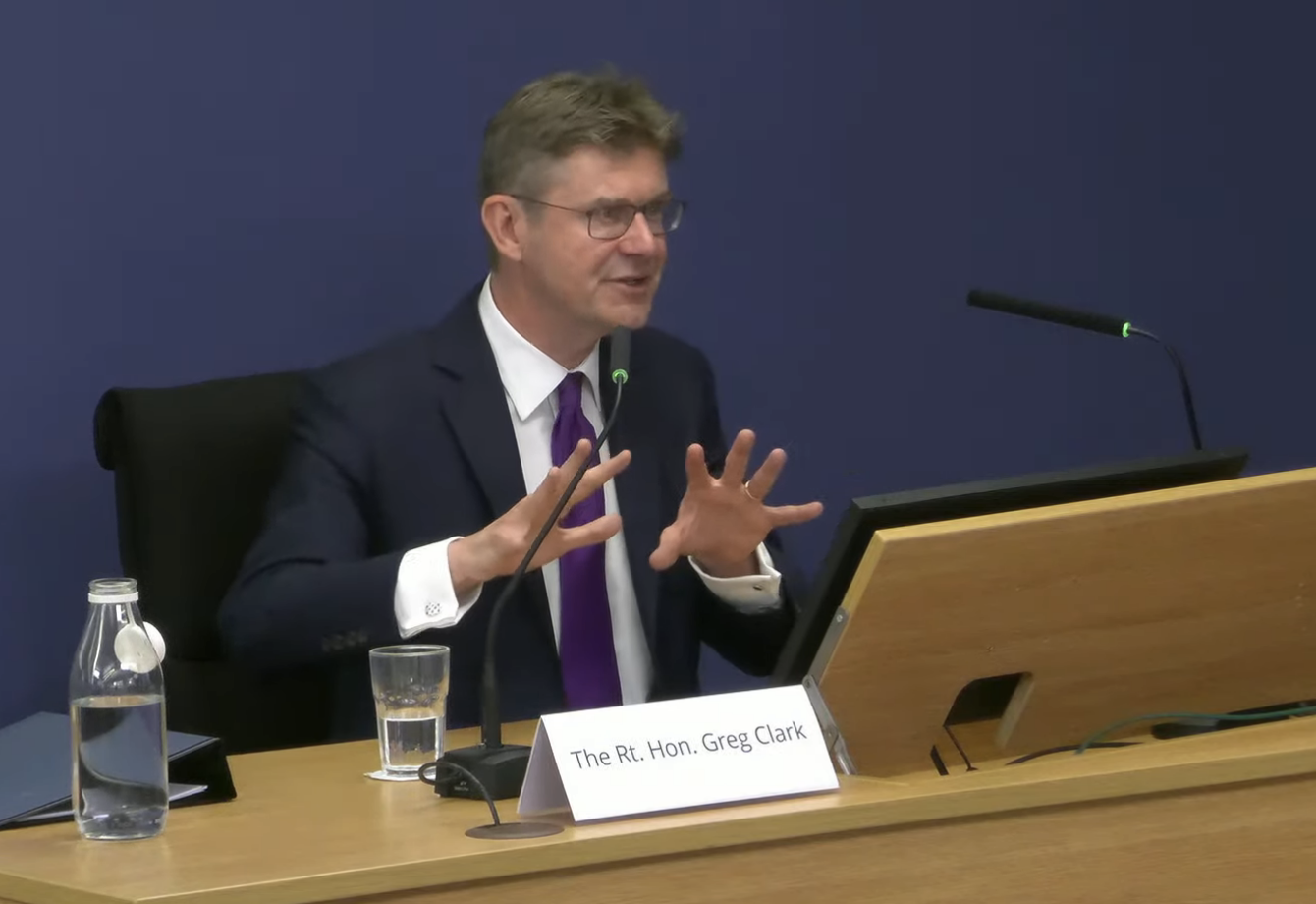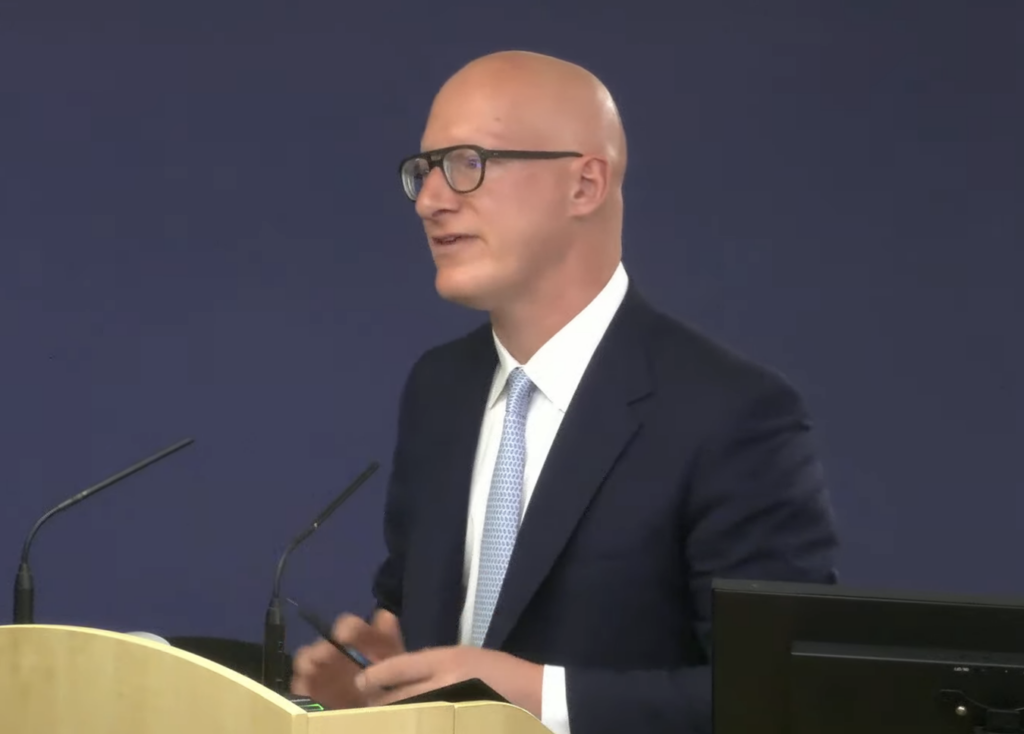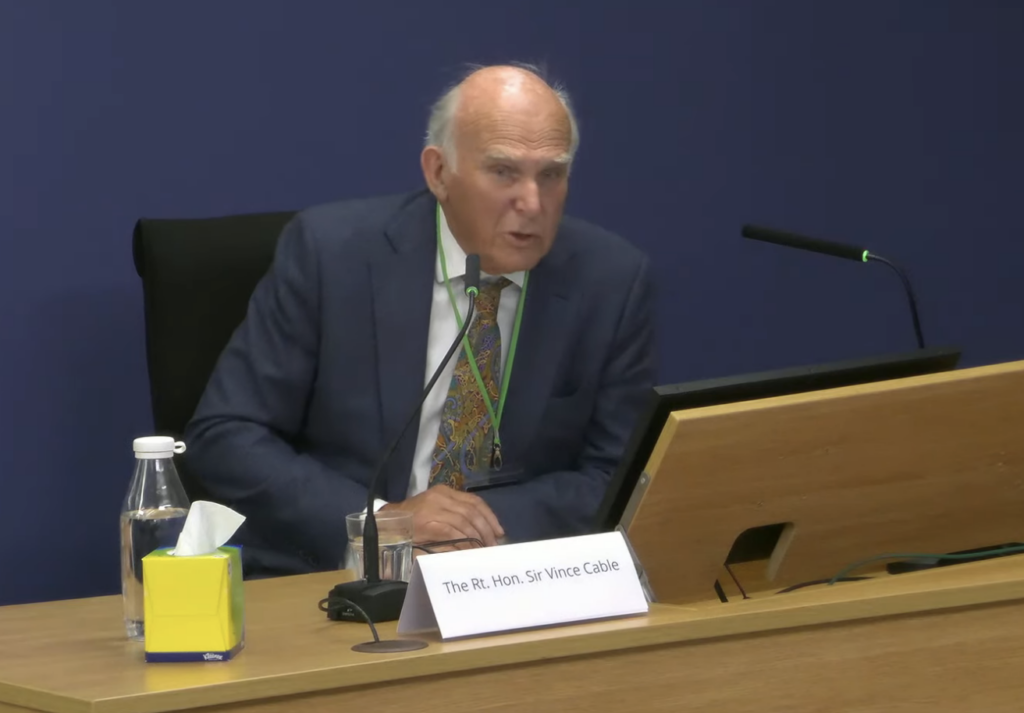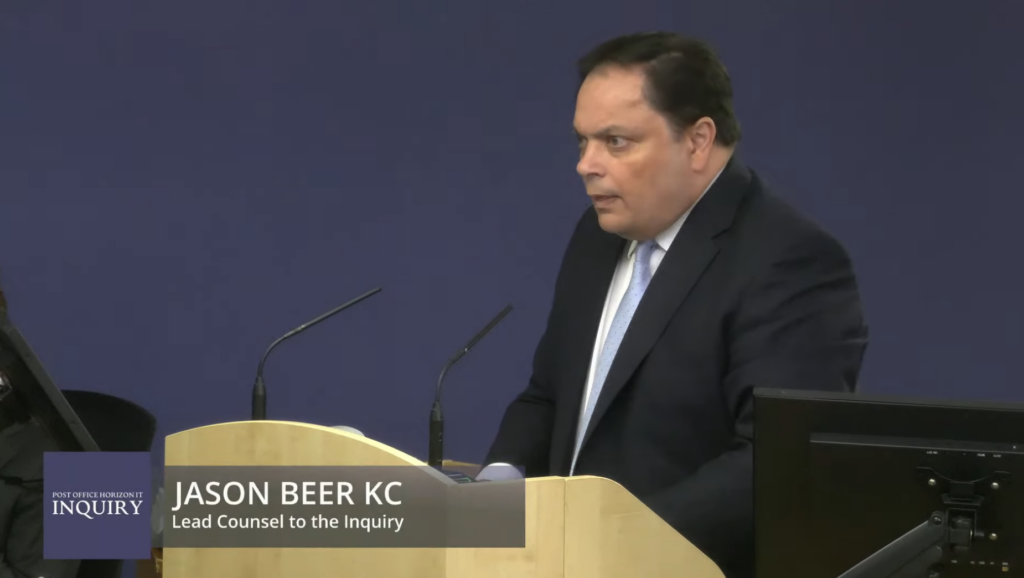
Two Secretaries of State, whose tenure in office covered significant periods of the Post Office scandal gave evidence at the Post Office Horizon IT Inquiry today. They are the most senior ranked and last politicians to give evidence in this phase, and some of what they had to say was illuminating, but not much.
Vince Cable was business secretary during the coalition government from 2010 to 2015. Greg Clark held the same post for the duration of Theresa May’s government, from 2016 to 2019. Clark made it clear he had no love for the Post Office given the way they had treated one of his constituents. In 2010, former Subpostmaster Pauline Thomson pleaded guilty to false accounting in a deal with the Post Office prosecutors who had initially accused her of the theft of £34,000 from her Post Office.
Shortly afterwards, Thomson joined the Justice for Subpostmasters Alliance and in 2013 joined the Post Office’s complaint and mediation scheme. In February 2015 Thomson was told she had been recommended by Second Sight and the scheme’s Working Group for mediation. Two days later she received a letter from the Post Office telling her they had declined to mediate with her.
Clark wrote to Post Office CEO Paula Vennells pointing out the disappointment Thomson felt and the inconsistency in the Post Office’s communications. He asked for an explanation as to why the Post Office had decided not to mediate. Clark told the Inquiry he received an “impudent” response from Vennells’ apparatchik Angela van den Bogerd telling him there was no inconsistency at all. Van den Bogerd wrote:
“The final decision on whether or not to mediate a case ultimately rests with the parties involved. It follows that either party can decline to take part. Mrs Thomson’s case has been thoroughly reinvestigated through the scheme and after careful consideration of all relevant facts including Second Sight’s final report, the Post Office has concluded that mediation does not offer any realistic prospect of resolving your constituent’s complaint for the reasons set out in the letter to her.”
Clark was not impressed with the van den Bogerd’s failure to “answer the question as to why Mrs Thomson was being refused the ability to arbitrate” and noted she couldn’t even be bothered to get her name right, calling her Paula, rather than Pauline, in the letter.
Clark said the experience of dealing with Vennells and van den Bogerd over Thomson’s case “conditioned my view of the management of Post Office Limited”.
Litigation
On his first day as business secretary, Clark was told the Criminal Cases Review Commission were looking at a number of Subpostmaster cases and civil litigation was looming. Clark told the Inquiry: “My view was to welcome the fact that the court was going to look at this, the High Court in particular. I thought the authority of a High Court judge, the requirements of disclosure and all the rest of the things, was a better way of resolving this than a process that involves the Post Office.“
Thereafter, Clark effectively took a back seat on matters relating to the Subpostmasters’ campaign, but he was keen to see the outcome. When the Common Issues judgment was handed down in March 2019 Clark told the Inquiry he thought it was “seminal”. Julian Blake, asking questions for the Inquiry asked him why. Clark replied “because the judge was very clear that the postmasters and mistresses were right, and that the Post Office had behaved despicably… and to the considerable detriment of the claimants“.

On hearing that the Post Office’s first response was to talk about appealing the judgment for “tactical” reasons, Clark says he was “incensed” by the use of this word:
“It seemed to me that this was a very important judgment that was strongly critical of the Post Office and supportive of the Subpostmasters, and it was instantly evident that that needed to be accepted and acted upon.”
Clark says he convened a meeting with his own civil servants, ordering a change of approach in both “substance and tone” in the Post Office’s approach to litigation. He also ordered the drawing up of options – including what he called the “nuclear” option of removing the board. Most importantly, he said he wanted the Post Office to start looking at proper “restitution”.
Unfortunately the Post Office was not in listening mode, and whilst Clark’s civil servants were trying (or not) to find a way to turn his words into action, the Post Office was heading towards a disastrous recusal attempt and appeal.
Cable’s Claims

Vince Cable claims he wasn’t even aware of Subpostmasters concerns about the Horizon IT system for the majority of his tenure as Business Secretary – repeatedly telling the Inquiry it was never brought to his attention. Or never properly brought to his attention. Letters sent to him by MPs and members of the public were either answered by his private office or diverted to the Postal Affairs ministers – Ed Davey, Jo Swinson and Normal Lamb.
When he did make enquiries, the National Federation of Subpostmasters (an organisation Cable said he trusted due to a previous interaction with them whilst he was a backbencher), assured his officials there was nothing wrong with the system.
Cable seemed entirely unaware of the Second Sight report, the growing parliamentary campaign and the Post Office’s complaint and mediation scheme, launched on his watch. He told Jason Beer KC, who asked him questions on behalf of the Inquiry, that whilst some documents did come his way, he received reassurances from his civil servants which he took on trust. Besides: “the way Parliament worked was that I walked past Mr Arbuthnot and the other MPs several times a day, and if they were concerned, they would surely have stopped and said something to me. I mean, they did on other issues…“
Beer wanted to know what Cable meant.
JB: Sorry, Sir Vince, are you saying there that James Arbuthnot was not concerned because he didn’t raise the matter with you?
VC: No, I’m sure…he was. I’ve read about his work and it was monumental. He did an enormous amount of good work. For whatever reason, the MPs who were concerned about this issue never raised it with me in Parliament. They had abundant opportunities to do so.
JB: You’re not being critical of them for failing?
VC: No, I’m not at all.
JB: You’re saying they simply took a different route?
VC: They took a different route, and different MPs operate in different ways. No, I’m not remotely critical… James Arbuthnot obviously did a heroic job. I wouldn’t dare to criticise him.
But he kind of was, and he returned to the same point later in his evidence.
VC: What is strange about this episode is that none of these 140 MPs ever came to talk to me about it. I had some of them coming to talk to me in the privacy of my House of Commons office about post office issues like the last bank in town where the post office were not being very proactive. Nobody came to talk to me… and for example the chairman of the select committee who I knew very well and respected he’s a very good parliamentarian had actually come to see me a few weeks before this episode and all he wanted to talk to me about was about the pub legislation and never raised the issue about the postmasters so I think I could be forgiven for not understanding the weight of this 140 MP campaign because none of them ever talked to me about it.
JB: He wrote you a detailed letter setting out his and the committee’s concerns.
VC: Yes but I think…
JB: Is that not enough?
VC: Certainly it wasn’t. No, I think all MPs realise that writing polite letters to departments isn’t necessarily the way to get through to people at the top of government. [You need] to [see] them face to face, and…
JB: So you do blame them for failing to come and see you.
VC: No, I’m not blaming them. I say different people had different styles. Some people operated through the formal processes of Parliament. Others didn’t. No, it’s not a question of blame. As I say, I had a great, having seen the mountain of work that they did, I have enormous respect for them. But it was… unfortunate that I never had any personal contact with the MPs about this matter.
JB: Would the outcome have been different? Is that what you’re saying Sir Vince?
VC: Yes, I think it probably would have been.
JB: In what way?
VC: Well, because I would have realised much earlier than March 2015 that there were serious problems were not being properly addressed by the post office and the department and I would have started to interrogate it much more aggressively as I did on quite a lot of other issues where MPs came to see me.

I asked James (now Lord) Arbuthnot about this and he said:
“I’d never heard Vince Cable speak or express any view about the Post Office. While I could have spoken to him, instead of doing that I’d held the Adjournment Debate on 17th December 2014, in which I and many other MPs had expressed their strong feelings to Jo Swinson, the Minister in direct charge of the Post Office. She entirely took the Post Office line. My own ministerial experience was that such a debate would have been well on the radar of the departmental Secretary of State, and it’s surprising that it apparently wasn’t.
I also took the matter to the chair of the Select Committee, Adrian Bailey, who immediately took it up and held his meeting. Again, such an evidence session should (according to my own ministerial experience) have been well on Cable’s radar.
I then raised the sacking of Second Sight with the Prime Minister in PM’s Questions, and he referred me to Vince Cable, to whom I wrote the same day. Cable wrote back, entirely taking the Post Office line. I was not to know that apparently he read neither my letter nor his own reply. I think it’s a bit rich of him to suggest he’d have taken a different line if I’d spoken to him. I simply don’t believe it.
He also raised the fact that it seems he held some sort of surgery for MPs on a Monday evening. That is a good thing, but useful only if MPs are aware of it (and yesterday was the first time I’d heard of it). But I go back to the first point, namely that I’d never heard him express any interest in the Post Office, which is rather confirmed by his evidence.”
Alan who?
By 2015 even Cable had clocked that there was a serious issue with the Post Office. The parliamentary noise was growing, and the Select Committee investigation took evidence from Alan Bates’ Justice for Subpostmasters Alliance. Unfortunately Cable says he was caught up in an arms-to-Saudi Arabia “crisis” which kept him occupied until parliament was dissolved, telling the Inquiry:
“I was having to decide about the export of weapons to Saudi Arabia that would be in use to bomb civilians, and I was keeping awake at night, because either I’d have blood on my hands or I’d make a decision that would have put large numbers of British workers out of work, so I was totally preoccupied with that problem”
When asked what he would have done if he had clocked what a problem the Horizon scandal was becoming, Cable told Beer:
“I would have got all these people around the table, the [Business] select committee, Mr Arbuthnot, the Post Office people and for the first time Mr Bates – I’d not heard of him till this point – and I’d have got them round the table and ask what the hell’s going on.”
Cable lost his seat in the 2015 general election and did not seek, nor was not sought out by his successor, Sajid Javid, to discuss the Horizon IT scandal. When Cable was got re-elected in 2017, he did nothing whatsoever to address the scandal, telling Beer he “lost all contact with this issue after 2015”.
The evidence of Clark and Cable seems to suggest that serious problems with governance and accountability are baked into our political system, and it’ll be interesting to see what, if anything, the Inquiry recommends is done about it.
You can read the collated live tweets of Cable’s evidence here, with added document screenshots.
The journalism on this blog is crowdfunded. If you would like to join the “secret email” newsletter, please consider making a one-off donation. The money is used to keep the contents of this website free. You will receive irregular, but informative email updates about the Post Office Horizon IT scandal.

Leave a Reply